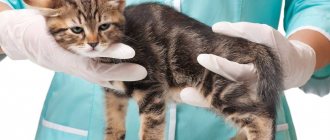Inflammation of the mucous and submucous membranes of large and small bronchi in domestic animals is called bronchitis. Often the trachea is also involved in this process. This common disease of the respiratory system most often affects weakened and sick pets. The inflammatory process in the bronchial tree can be acute or chronic. According to etiology, bronchitis is primary and secondary.
What is feline bronchitis???
Like humans, cats can also get bronchitis. Feline bronchitis is a respiratory disease caused by inflammation of the cat's bronchi, leading to airway obstruction. It can be caused by various underlying factors such as bacterial or viral infection, irritation or allergies. Inflammation in the respiratory tract. Makes it difficult to breathe , causing the cat to suffocate. This is one of the most common symptoms of bronchitis in cats. Another cough is how the cat's body tries to get rid of excess mucous, which often causes inflammation.
Feline bronchitis usually appears in one of two forms: acute or chronic bronchitis. A cat with acute bronchitis will suddenly develop symptoms, usually due to an illness such as the flu or a cold, and they will last for a fixed period of time. Chronic feline bronchitis , which can be asthmatic in nature, is recurrent and persists for much longer.
In the following sections, we will discuss each type of feline bronchitis in detail, including the symptoms to consider and treatment options for each...
Etiology
Bronchitis is classified according to several determining factors.
Based on the location, a distinction is made between macrobronchitis, when catarrhal phenomena develop in large and medium-sized bronchi, microbronchitis, in which only small bronchi are affected, and diffuse, when inflammation spreads to all parts of the bronchial tree. Depending on the type of exudate formed during inflammation, bronchitis is divided into catarrhal, purulent and hemorrhagic. The causes of acute inflammation of the bronchi in cats can be:
- inhalation of irritating substances (dust, tobacco smoke, aerosols);
- hypothermia (long stay on cold ground, under snow, rain, draft);
- currently transmitted or recently transmitted infectious diseases (rinotracheitis, adenovirosis, bordetellosis);
- parasitic diseases, in particular helminthiasis.
Chronic bronchitis develops as a result of a less intense, but longer-lasting action of harmful factors, or transforms from an acute form of the disease in the absence of proper treatment.
Acute bronchitis in cats: causes and symptoms
As we have already explained, both types of feline bronchitis are caused by inflammation of the airways. However, acute feline bronchitis develops quickly and is short-lived. A sick cat usually has a cough , and may show signs of difficulty breathing, such as whistling. A cat's cough can be dry, which indicates a viral infection, or it can produce mucus, which indicates a bacterial infection. Other symptoms that may include signs of an underlying infection such as:
- Fever
- Loss of appetite
- Sneezing
- A sore throat
- Malaise
Read more about colds in cats in our article on colds in cats.
Acute bronchitis in cats is usually not a critical condition. However, in extreme cases, breathing can be severely restricted, resulting in a lack of oxygen. A cat in this condition will show cyanosis , which is a bluish discoloration of mucous membranes and tissues such as the gums. This is veterinary care , and if you notice cyanosis or other signs that your cat is not breathing properly, you should take them to the vet immediately.
Symptoms
Early detection of signs of bronchitis will prevent the spread of the disease, which can spread to the lungs with serious consequences, for example, the pet will get pneumonia.
Common symptoms of the disease:
- Cough, which can be dry or immediately with sputum, accompanied by a whistling sound. It is very difficult to detect the presence of a cough because in cats it sounds like sneezing or gagging.
- Hypoxia, which occurs with severe coughing and lack of oxygen. Often accompanied by blue discoloration of the gums and oral mucosa.
- Vomiting. They can be caused by an excessively strong cough.
- Rhinitis, conjunctivitis, enlarged lymph nodes.
- Loss of appetite occurs during intoxication of the body.
- Lethargic, weakened state of the pet.
- Fever and chills.
- Disorder of the digestive system due to viral infection.
Bronchitis can lead to pneumonia
Acute bronchitis in cats: diagnosis and treatment
Cats have several diseases that also cause inflammation and have clinical symptoms similar to acute bronchitis. Therefore, only a veterinarian can make an accurate diagnosis, and before diagnosing acute bronchitis in your cat, the veterinarian should refuse :
- Heart failure
- Pleural effusion
- Feline infectious peritonitis (FIP)
- Filariasis or heart parasites.
- Neoplasia
- Chronical bronchitis
Because the stress of clinical management can aggravate a cat's illness, the veterinarian will prioritize stabilizing the cat's breathing before performing most tests. A chest x-ray can usually confirm the diagnosis of feline bronchitis and rule out other lung diseases. Bronchoscopy or bronchoalveolar lavage
this can also be done. They can help examine your cat's respiratory tract and analyze mucus samples to look for germs. These tests must be performed under general anesthesia and will only be recommended if an infection is suspected. Examination of cat feces can also be done to confirm or rule out parasites...
If your cat's bronchitis is caused by a mild illness such as a cold, it will usually go away on its own within a week or two. Your veterinarian may prescribe a cough suppressant for cats, or you can help relieve it with simple home remedies. If the underlying cause is a bacterial infection, it should be treated with the appropriate infection. Antibiotics , which only a veterinarian can prescribe. Your veterinarian may also prescribe corticosteroids for short-term relief to reduce airway inflammation.
Chronic bronchitis in cats: causes and symptoms
Chronic bronchitis is a relapsing condition that is also characterized by coughing and wheezing. It is difficult to distinguish it from feline asthma , in which case it is more accurately called asthmatic or allergic bronchitis. This condition is relatively common among cats, especially cats over 8 years of age...
The main difference between asthmatic and chronic bronchitis in cats is the reversibility of inflammation and damage to the airways. In chronic bronchitis it is irreversible . The disease most often affects cats over eight years of age, and some cat breeds, such as Siamese, show a greater predisposition to the condition.
The word chronic alone means that the symptoms of bronchitis occur for two or more months together and then recur. As we have already discussed, bronchitis in cats causes inflammation that leads to airway obstruction and is often aggravated by excess mucus secretion.
In the case of asthmatic bronchitis, inflammation is usually caused by an allergic reaction, that is, increased sensitivity to certain irritants. Various irritants can cause allergic reactions, including air pollutants such as smoke or tobacco dust, substances in cat droppings, plants, etc. When it comes to chronic bronchitis, specific causes are difficult to pinpoint. Symptoms of both asthma and chronic bronchitis in cats include:
- Constant cough
- Nausea sounds
- Shortness of breath
- Difficulty or rapid breathing
- Breathe with your mouth open.
- Lethargy and weakness
As with acute bronchitis, the most serious cases may constitute an emergency because the cat may not be able to breathe . In such cases, you should take him to the vet immediately. In other cases, a cat with chronic bronchitis may have only mild symptoms, such as open-mouth breathing after exercise. The veterinarian will determine treatment measures according to their diagnosis and the severity of the cat's symptoms...
Possible reasons
Inflammation of the upper respiratory canals occurs for the following reasons:
- hypothermia;
- allergy;
- helminthic infestation;
- infectious diseases.
Hypothermia
Most cats, excluding bare-haired cats, are not afraid of frost, but of hypothermia due to drafts or wetness. Most often, the disease is caused by the housewives themselves, who perceive the cat as a toy. A five-minute stay in a draft after bathing is enough for your pet, and bronchitis is guaranteed.
Feeding a cat frozen fish or other delicacy from the refrigerator leads to a cold that occurs with signs of bronchitis.
Allergy
When the immune system fails, it mistakes harmless or low-toxic substances for poisons or infectious agents. Killer cells destroy a true or imaginary enemy, at the same time destroying surrounding tissues. If the reaction occurs in the respiratory canals, bronchitis develops. When the mucous membrane is irritated by chemicals, for example, tobacco smoke, the smell of a houseplant, tray filler, or the housewife's cosmetics, the immune system remembers them.
Worm infestation
When infected with helminths, the larvae hatched in the intestines penetrate the bloodstream, are carried into the lungs, develop there, and move into the bronchi. Parasites that irritate the internal epithelial membranes are coughed up and sent into the mouth, where they are swallowed and continue to develop in the digestive tract. The injured surface is contaminated with bacteria that cause an inflammatory reaction.
Bronchitis occurs as a result of infection by secondary microflora of an organism weakened by viral diseases. The most dangerous of them are panleukopenia, calcivirosis, and infectious rhinotracheitis.
Chronic bronchitis in cats: diagnosis and treatment.
Chronic bronchitis in cats is diagnosed in the same way as acute bronchitis, and your veterinarian will perform similar tests to rule out other possible causes of inflammation in the respiratory system. A chest x-ray provides information about the condition of the lungs and heart, and bronchoscopy or lavage may be used to examine the airways and determine possible infections.
Chronic bronchitis , also called chronic obstructive pulmonary disease ( COPD ), is diagnosed when the inflammation does not appear to be easily reversible. Even if your cat has asthmatic bronchitis, there is no safe treatment and treatment will focus on reducing the cat's discomfort, controlling coughing, treating any infection, and taking steps to make breathing easier. Some of these are similar to treatments for acute feline bronchitis. Here are some of the treatment options your veterinarian may suggest:
- Glucocorticoids
- Bronchodilators
- Oxygen therapy
- Long-term weight control
If a single allergen is identified as the cause of recurrent asthmatic bronchitis, the best treatment is to eliminate stimulation from the cat's environment as much as possible. For example, try a different brand of cat litter, eliminate allergy-causing foods, dust your house more often, or avoid smoking around your cat. Immunotherapy may also be offered to help your cat overcome its allergies.
How to diagnose
To exclude similar pathologies and understand the physical condition of the lungs of a sick cat, the chest is listened to and tapped. Basic tests used in diagnosing diseases of the respiratory system include:
- a blood test showing an increase in white blood cells and neutrophils if the result is positive;
- stool analysis necessary to identify helminths;
- analysis of sputum and bronchial washings, identifying the type of pathogen in the case of an infectious cause;
- X-ray in frontal and lateral projections, assessing the degree of damage to the lung tissue.
When confirming the diagnosis and determining the cause of the disease, the veterinarian selects drugs to destroy the pathogen and relieve the symptoms that arise. If there is no threat to life, treatment is carried out at home.
Home Remedies for Feline Bronchitis
After a professional diagnosis and prescription, you can also contact your veterinarian for recommendations on home care for a cat with bronchitis. Apart from strictly following any course of prescribed medications , there are certain home remedies that can help relieve the symptoms of acute or chronic feline bronchitis...
For a cat who is suffering from temporary acute bronchitis , here are some home remedies that can help reduce the discomfort caused by airway inflammation and coughing:
- Provide sufficient water to maintain hydration. This will help dilute the mucus and eliminate it...
- Use a humidifier to increase the humidity in the air. This will also help relieve cough.
- Reduce any irritants that may worsen your cat's cough, such as dust or smoke.
- Make sure your cat stays warm to prevent your cough from getting worse.
- Monitor your cat's progress with your veterinarian to make sure he is improving. Lack of treatment for acute bronchitis can lead to chronic bronchitis.
In the case of chronic bronchitis or asthmatic bronchitis, here are some recommendations to improve your cat's quality of life and relieve its symptoms or reduce the frequency of attacks:
- Remove irritants or allergens such as smoke, air fresheners, incense, dust, pollen, cleaning products, etc...
- Use silica litter to prevent dust formation.
- If your cat is overweight or obese, you should go on a diet. Monitoring your cat's weight will help reduce the severity of symptoms.
- Encourage gentle exercise. This helps clear the airways until the cat becomes tired.
- Check your cat's dental hygiene to prevent bacteria from entering the respiratory system...
- Minimize stress in the cat's environment and make sure it is comfortable.
This article is purely informational. HowMeow.ru does not have the right to prescribe veterinary treatment or diagnose. We invite you to take your pet to the vet if you are suffering from any illness or pain.
Prevention
In order to prevent your pet from getting sick, you need to regularly carry out preventive work, which is actually not as difficult as it seems. You can avoid many diseases, including bronchitis, by following simple rules:
- make sure that the cat does not become overcooled;
- eliminate drafts;
- make your pet a warm bed or buy houses so that the cat does not sleep on the cold floor.
- place the sleeping area away from doors and windows, which can be sources of drafts;
- feed your pet a balanced diet enriched with the necessary vitamin and mineral complex;
How to feed a cat natural food?
- give water only at room temperature;
- Make sure that your pet does not have access to household chemicals and do not spray aerosols harmful to your pet in the room;
- carry out weekly cleaning with a damp cloth;
- do not bathe your cat during the cold season;
- Avoid keeping your pet out in the rain or wet snow.
What do you need to know? The most common respiratory disease in cats is bronchitis. If you notice symptoms indicating the presence of a disease in your pet, immediately show it to a specialist in order to begin treatment on time.
The cat should have a specially designated place, located in a warm, dry place without drafts, preferably soft bedding or a house











